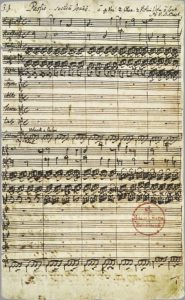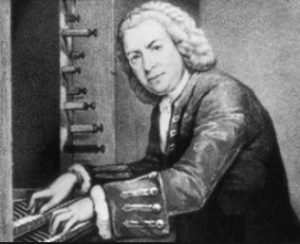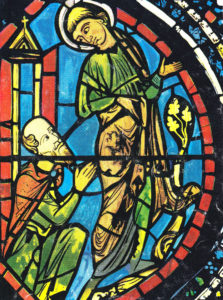CANCELLED – St. John Passion – J S Bach – April 4th 2020
This concert has been CANCELLED.
A Saturday evening concert in Sunderland Minster starting at 7.30 p.m., conducted by David Murray.
Tickets £14.00 for Nave (£8 concessions for full-time students and on income related benefits) or £8.00 (Gallery – limited view). Accompanied under 16s free. Tickets are available from members of the Society, at the door, or on-line from http://www.wegottickets.com/BCS – who also have a direct link on the home page of this website. Doors open from 6.45 p.m. Apart from seats marked for Patrons there are no allocated seats.
To be sung in the original German.
Soloists : Elinor Rolfe Johnson – Soprano, Jorge Navarro Colorado – tenor (Evangelist), James Laing – countertenor, Felix Kemp – baritone (Christus), Nathaniel Thomas Aitkin – tenor, and Patrick Owston – baritone.
From 1723 until his death Bach was employed as Kantor at the Thomasschule in Leipzig. It was a prestigious but demanding post, requiring him not only to teach at the school but also to play the organ, train the choir and compose the music for the city’s two principal Lutheran churches, Thomaskirche and Nikolaikirche, as well as supervising and training the musicians at two others. Despite this heavy workload and frequent disputes with his employers, Bach composed some of his greatest music during this period. His choral compositions alone include such enduring masterpieces as the Mass in B minor, Magnificat, Christmas Oratorio, and the St John and St Matthew Passions.
The St John Passion, a sacred oratorio by Johann Sebastian Bach, is “carefully designed with a great deal of musico-theological intent”.
 The original Latin title Passio secundum Joannem translates to “Passion according to John”. Bach’s large choral composition in two parts on German text, written to be performed in a Lutheran service on Good Friday, is based on the Passion, as told in two chapters from the Gospel of John (John 18 and John 19) in the translation by Martin Luther, with two short interpolations from the Gospel of Matthew. During the vespers service, the two parts of the work were performed before and after the sermon.
The original Latin title Passio secundum Joannem translates to “Passion according to John”. Bach’s large choral composition in two parts on German text, written to be performed in a Lutheran service on Good Friday, is based on the Passion, as told in two chapters from the Gospel of John (John 18 and John 19) in the translation by Martin Luther, with two short interpolations from the Gospel of Matthew. During the vespers service, the two parts of the work were performed before and after the sermon.
Part I covers the events until Peter’s denial of Jesus, Part II concludes with the burial of Jesus. The Bible text is reflected in contemporary poetry and in chorales that often end a “scene” of the narration, similar to the way a chorale ends most Bach cantatas. An anonymous poet supplied a few texts himself, quoted from other Passion texts and inserted various stanzas of chorales by nine hymn writers. The Passion, close to Bach’s heart, has an “immediate dramatic quality”.
The anonymous libretto draws on existing works and is compiled from recitatives and choruses narrating the Passion of Christ as told in the Gospel of John, ariosos and arias reflecting on the action, and chorales using hymn tunes and texts familiar to a congregation of Bach’s contemporaries. Compared with the St Matthew Passion, the St John Passion has been described as more extravagant, with an expressive immediacy, at times more unbridled and less “finished”.
Originally Bach intended that the St John Passion would be first performed in the St. Thomas Church in Leipzig, but due to a last-minute change by the music council, it was first performed on Good Friday of 1724 in the St. Nicholas Church, shortly after Bach’s 39th birthday. Bach quickly agreed to their desire to move the service to St. Nicholas Church, but pointed out that the booklet was already printed, that there was no room available and that the harpsichord needed some repair, all of which, however, could be attended to at little cost; but he requested that a little additional room be provided in the choir loft of St. Nicholas Church, where he planned to place the musicians needed to perform the music. The council agreed and had to send out a flyer announcing the new location to all the people around Leipzig!
it was first performed on Good Friday of 1724 in the St. Nicholas Church, shortly after Bach’s 39th birthday. Bach quickly agreed to their desire to move the service to St. Nicholas Church, but pointed out that the booklet was already printed, that there was no room available and that the harpsichord needed some repair, all of which, however, could be attended to at little cost; but he requested that a little additional room be provided in the choir loft of St. Nicholas Church, where he planned to place the musicians needed to perform the music. The council agreed and had to send out a flyer announcing the new location to all the people around Leipzig!




 Saint Nicolas, Op. 42, is a cantata with music by Benjamin Britten on a text by Eric Crozier, completed in 1948. It covers the legendary life of Saint Nicholas, Bishop of Myra, Lycia, in a dramatic sequence of events. The composer wrote the work for the centenary of Lancing College in Sussex, with the resources of the institution in mind. It is scored for mixed choir, tenor soloist, four boys singers, strings, piano duet, organ and percussion. The only professionals required are the tenor soloist, a string quintet to lead the other strings, and the percussionists. Saint Nicolas is Britten’s first work for amateur musicians. The premiere was the opening concert of the first Aldeburgh Festival in June 1948, with Peter Pears as the soloist. St. Nicolas marks Britten’s first professional work intended primarily for performance by amateur musicians. While the piece was written for Lancing College, the first performance was actually, with the College’s permission, the opening concert of the first Aldeburgh Festival on 5 June 1948. Crozier’s libretto paints a dramatically bold portrait of the saint’s character, exaggerating the legends and glory that have accumulated over the centuries around Nicolas’s story. Britten’s music enhances the drama of Crozier’s text using striking contrasts in instrumentation, vocal style, and musical textures
Saint Nicolas, Op. 42, is a cantata with music by Benjamin Britten on a text by Eric Crozier, completed in 1948. It covers the legendary life of Saint Nicholas, Bishop of Myra, Lycia, in a dramatic sequence of events. The composer wrote the work for the centenary of Lancing College in Sussex, with the resources of the institution in mind. It is scored for mixed choir, tenor soloist, four boys singers, strings, piano duet, organ and percussion. The only professionals required are the tenor soloist, a string quintet to lead the other strings, and the percussionists. Saint Nicolas is Britten’s first work for amateur musicians. The premiere was the opening concert of the first Aldeburgh Festival in June 1948, with Peter Pears as the soloist. St. Nicolas marks Britten’s first professional work intended primarily for performance by amateur musicians. While the piece was written for Lancing College, the first performance was actually, with the College’s permission, the opening concert of the first Aldeburgh Festival on 5 June 1948. Crozier’s libretto paints a dramatically bold portrait of the saint’s character, exaggerating the legends and glory that have accumulated over the centuries around Nicolas’s story. Britten’s music enhances the drama of Crozier’s text using striking contrasts in instrumentation, vocal style, and musical textures